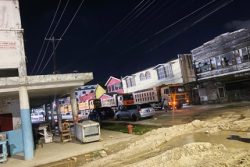 Late last November the Government of Antigua gave notice to the World Trade Organisation’s (WTO) Disputes Settlement Body (DSB) that if the United States did not reach “an appropriate and beneficial settlement” in relation to a legal adjudication made previously in its favour, it would act to recover the revenue it has lost.
Late last November the Government of Antigua gave notice to the World Trade Organisation’s (WTO) Disputes Settlement Body (DSB) that if the United States did not reach “an appropriate and beneficial settlement” in relation to a legal adjudication made previously in its favour, it would act to recover the revenue it has lost.
At the heart of the matter was a decision by the US Government to invoke US federal laws (the Wire Act, the Travel Act, and Illegal Gambling Business Act) to halt gaming companies incorporated in Antigua, and others, from providing such services on a cross border basis into the US.
In response, in 2004, Antigua brought a WTO case against the US for the economic damage caused, and for violating its international obligations under the General Agreement on Trade in Services. The WTO’s arbitration panel found in Antigua’s favour, and when the US appealed, all subsequent verdicts reached the same general conclusion that the US action had deprived Antigua of trade revenues.
Despite this, Antiguan consultations in Washington on a financial settlement led nowhere, with the US declining to provide compensation, causing Antigua to take the issue to the WTO’s Disputes Settlement Body Arbitrator to request permission for trade retaliation. In 2013, at the end of a long judicial process the body formally authorised Antigua to take measures that would compensate it for the economic damage caused. In doing so, the arbitrator agreed to allow it to lift US intellectual property protection on up to US$21m annually on, for example, copyrighted music, movies or books, in a manner that would enable government to retain the royalties that would have otherwise gone to their US creators.
Hoping that this would resolve the issue, Antigua once again sought to resolve the matter with the United States Trade Representative through a negotiated financial settlement. However, when it became apparent that the US was not prepared to reach a reasonable financial settlement, it informed the Disputes Settlement Body at its November 2016 meeting that it was prepared to legally enforce the suspension of copyright on the sale of US intellectual property, as allowed for by the WTO’s dispute settlement ruling of January 2013.
Responding formally at the Geneva meeting, the US said that it remained committed to resolving the issue and had taken a constructive approach to resolving the matter.
It however told the meeting that it expected Antigua to ensure any such “unprecedented step” was “transparent and within the DSB’s authorization”, warning that the suspension of intellectual property rights “would be counter to Antigua own interests”. In Geneva, the US also suggested that Antigua was standing in the way of a package of multilateral service concessions that it was offering to WTO members as compensation for having previously removed internet gambling from the US schedule of commitments.
What is clear from a close reading of the documents and speaking to some of those involved on both sides is that the USTR’s approach has consistently involved the US in trying to significantly reduce the value of any settlement to Antigua. More recently it appears to have argued that even if it could agree, the US Congress would have to be persuaded to vote the funds required, and it would have to canvass US agencies to see how they might be able to contribute financially to a settlement.
Antigua, in response, is understood to have pointed out that the US has several available mechanisms and precedents for sourcing the funding to settle the dispute. One particular suggestion is that the US Treasury’s Judgement Fund, which was established by Congress specifically to enable US federal agencies to reach compromise settlements, might be utilised in any final solution.
This lengthy process is worth describing in detail because it makes clear that Antigua has done everything required of it to make its case and obtain an outcome under WTO rules that legally and morally justify its seemingly aggressive present position. More importantly, the case is not just about Antigua or the representations made by successive Antiguan governments, but about important matters of global principle and governance at a time when the US may be about to set aside the established trade order.
The case is in many respects extraordinary as it demonstrates that despite successive US governments frequently stated commitment to a rules-based international trade system, Washington has not been prepared to accept its WTO commitments and settle with Antigua. As Antigua told the Disputes Settlement Body in November, the “protracted failure” by the US to settle its non-compliance with WTO rules “has the potential to collapse confidence in the efficacy and credibility of the rules-based trading system.”
It is of course no secret that in some parts of US government, officials express unrelated reservations about Antigua. However, that is of no relevance in this instance.
The final WTO ruling and the arbitral award are clear cut, having the support of the members of the WTO, a multilateral body that up to now the US has regularly brought complaints to when it believes that its trade interests have been damaged. Moreover, its failure to conform means more generally that it cannot be WTO compliant until it either reaches a settlement, or takes the unlikely step of opening its market to internet gaming from Antigua.
In the last few days the US President elect has nominated Robert Lighthizer, a long-time advocate of greater protectionism, to be his US Trade Representative.
Although the Antigua issue is unlikely to figure high on his agenda, it ought to, as it speaks directly to the US government’s willingness or otherwise to respect its rules-based trading relationships with the rest of the world.
If Antigua’s decision to retaliate is implemented, the effect will be to bring into conflict a small Caribbean nation and a newly muscular and protectionist approach by the US administration. More broadly it may also reveal what Washington’s future thinking is about its attitude to the present equitably applied system of international trade.
Antigua has a legal and a strong moral case for full compensation. It is a position that the incoming US administration should respect.
Previous columns can be found at www.caribbean-council.org








